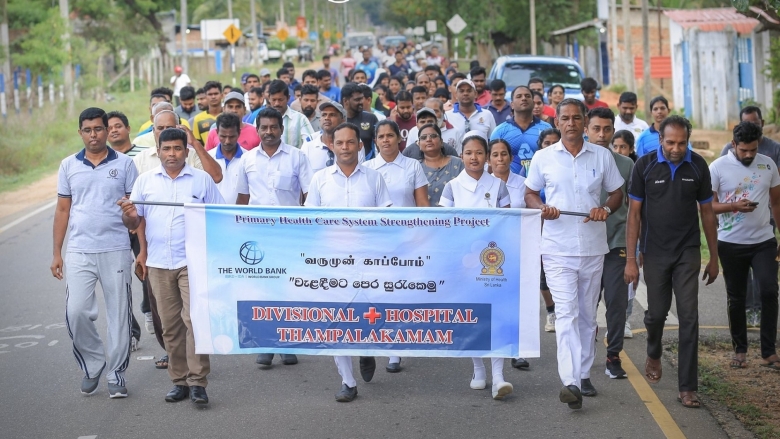The management and control of NCDs requires a lifecycle approach with a strong focus on preventive care, and this has warranted a reorganization of the country’s primary healthcare system. The World Bank-funded Primary Healthcare System Strengthening Project (PSSP) is at the core of the reorganization of primary curative care services planned by the Ministry of Health (MoH). The objective of the PSSP is to support the government to increase the utilization and quality of primary healthcare services, with an emphasis on the detection and management of NCDs in high-risk groups.
Curative primary healthcare services in Sri Lanka are delivered mainly through Primary Medical Care Institutions (PMCI), which include district level hospitals and Primary Medical Care Units situated around the island. The project, which is led by the Director General of Health Services and the Secretary to the MoH, is spearheading the primary care reorganization under the guidance and supervision of the technical heads of the respective national programmes at the MOH. The aim is to establish a system to detect and manage NCDs throughout the lifecycle. Adults over 35 years of age are being registered at PMCIs where their health records are maintained for follow-up visits to manage their conditions. This helps to better coordinate patient care over time and throughout the referral chain.
NCD management also involves lifestyle and attitude change, and the PSSP is promoting community engagement in NCD prevention. The project has established ‘Friends of the Facility’ committees (FFC) attached to PMCIs which consist of religious and community leaders. The FFCs play an important role in introducing the new primary healthcare concept to their communities.
The Thampalakamam hospital is one of the PMCIs supported by the project, and Dr. Jeevaraj and his team have made commendable progress with NCD screening and registration. “The FFC members went house to house, created awareness, and collected the data we needed. We initiated a prescheduled appointment system and even during the pandemic we screened 10 people per day. We could never have maintained the continuity of the programme without the FFC,” says Dr. Jeevaraj.
Mr. M. Krishnapillai, the Chairperson of the Thampalakamam FFC played a key role in this effort. “We told people about the importance of NCD screening. After the screening many people told us that we have increased their life expectancy through this effort,” he smiles.
The PSSP has also supported the introduction of a range of ‘patient friendly services’ to encourage people to come in for screening and follow up. At the Rajanganaya PMCI in the Anuradhapura District night clinics are held to accommodate the working population. “First, they educated the FFC committee on NCD risk factors. Now we know to direct people with high risk factors to the hospital,” explains Krishanthi Nuwala, Secretary of the Rajanganaya FFC.
The focus on NCDs has led to an attitude change. “Young people here were focused on work and had no time for exercise. Now they can come forward and understand what is wrong with their bodies and how to stay healthy,” says Mr. Mahendran, from the Thampalakamam FFC.
The PSSP is now halfway through implementation and these results are encouraging. Though there is more to be done, the progress made thus far has demonstrated the potential impact of developing PMCIs and the value of engaging local communities in these efforts. “Personally, I feel we have made a big change in our community” says Krishanthi proudly.


